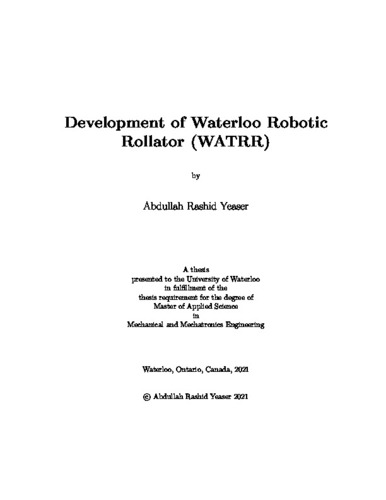| dc.description.abstract | One of the major risk factors for impaired mobility is aging, and with the aging population on the rise, the demand for assistive technologies for individuals with mobility impairment is at an all time high. Impaired mobility can lead to loss of independence, increased chance of mortality, deterioration of health, decreased cognitive function and a poor quality of life. Moreover, individuals with impaired mobility also tend to have higher hospital utilization costs. Mobility capability can be (re)built through the use of assistive technologies.
Rollators/Walkers are a commonly used mobility aid that has shown to help with mobility by providing support, particularly transferring a portion of the lower limb loads to the upper limbs. However, safety has been a concern with rollators, with thousands of accidents occurring every year. Currently, many research projects are investigating methods to improve rollators, particularly surrounding the use of robotic rollators.
At University of Waterloo Neural and Rehabilitation lab (NRE lab), our goal is to develop technology to improve lives of people, with development of robotic rollators being one of our research foci. The Waterloo Robotic Rollators (WATRR) is an active rollator system with built-in sensing and actuation systems. It is believed that the user experience and safety of rollators can be improved through the use of smart control algorithms.
The purpose of this thesis was to develop methods to address safety and user experience concerns by proposing a hybrid control approach, where distance and orientation control are key control parameters, including automatic braking. First, the Waterloo Robotic Rollator (WATRR), a low weight robotic rollator platform, representative of current rollators with sensors and actuators is presented. I describe key design decisions for the platform, offer an overview of the software architecture, and discuss further research development goals. The proposed hybrid controller is then described and both simulation and experimental data for controller design is presented.
To enable the envisioned hybrid control systems, a human state estimator and a robot state estimator are required. The human state estimator uses computer vision and machine learning in a hourglass network structure to predict shoulder locations. Using the estimated location and depth data, human velocity, distance and orientation relative to the rollator are estimated. For the robot state estimator, a new velocity estimator based on learning methods is proposed. As rollator lateral velocity can be difficult to estimate with traditional methods, we propose an augmented learning-aided state estimator. This estimator is a Long- Short-Term Memory (LSTM) based estimator, augmented with an Unscented Kalman Filter (UKF). The proposed estimator was validated through experimental data.
The main contribution of this thesis was a new lightweight rollator system with sensors and actuators that enabled development of advanced controls. Next, previous control systems are not only improved upon by using a new hybrid controller but also implemented on our platform. A new robot state estimator is developed that relies solely on the kinematics and is able to estimate lateral velocity with a mean error of $<10mm/s$ without requiring additional instrumentation or knowledge of the rollator's time varying parameters. Finally, a new human state estimator is designed which does not require instrumentation on the human and outperforms current estimators. | en |

